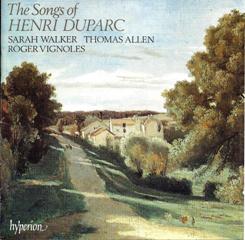Henri Duparc – The Songs of Henri Duparc (1989)
Henri Duparc – The Songs of Henri Duparc (1989)

[01] L’Invitation au voyage (1870) [02] Serenade florentine (1881) [03] Testament (1883) [04] Phidyle (1882) [05] Extase (1874) [06] La vague et la cloche (1870) [07] Chanson triste (1868) [08] Le Galop (1869) [09] Romance de Mignone (1869) [10] Serenade (1869) [11] La Fuite, duet (1871) [12] Lamento (1883) [13] Elegie (1874) [14] Le manoir de Rosemonde (1879) [15] Au paise ou se fait la gerre (1870) [16] Soupir (1869) [17] La Vie anterieure (1884) Sarah Walker - mezzo-soprano Thomas Allen - baritone Roger Vignoles - piano
This CD presents the brief but remarkable output of songs by Duparc during his artistic period that was cut short by a nervous affliction. These works are beautifully performed by mezzo-soprano Sarah Walker and baritone Thomas Allen, with sensitive piano accompaniment by Roger Vignoles. The collection opens with Duparc's best known melody, L'invitation au voyage, which is a setting of a text from Baudelaire's Les fleurs du mal. The lovely rolling impressionist piano harmonies are played with exquisite fluidity, as they underscore Walker's velvety and intimate vocals. The Sérénade florentine is an impressionist lullaby to a loved one, delivered with touching emotion by Thomas Allen. Extase, Elégie and Testament show the influence of Wagner, and the Chanson triste is one of Duparc's early, Gounod-style songs. Au pays oú se fait la guerre (1869) is also an early work, but is particularly entrancing with simple modal harmonies and easily perceived song construction. By sensitive use of passing tones in the piano, the harmonies are subtly redefined and the music is extended dramatically toward the end by expressive on-rushes. Other early works included here are the Sérénade, Romance de Mignon, Le Galop, and the duet La Fuite, with their relatively unsophisticated stormy chromaticisms and pastoral settings. The more mature work is represented here by the expansively lyrical Phidylé, built in unhurried gradual steps by Allen, and by the last song that Duparc wrote, La vie antérieure, another setting of a Baudelaire text mixing modal (mixolydian) and impressionist harmonies and passionately nostalgic emotion. This type of modality is also employed in Soupir. --- "Blue" Gene Tyranny, Rovi
download: uploaded yandex 4shared mediafire solidfiles mega zalivalka filecloudio anonfiles oboom
